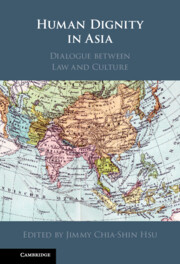Book contents
- Human Dignity in Asia
- Human Dignity in Asia
- Copyright page
- Dedication
- Contents
- Editor and Contributors
- Preface
- Abbreviations
- Introduction Human Dignity, Human Rights, and Cultural Change in Asia
- 1 Human Dignity in Indian Constitutional Adjudication
- 2 The Development of Individual Dignity in Japan
- 3 Constitutional Discourse on Human Dignity in South Korea
- 4 Human Dignity in the Jurisprudence of the Taiwan Constitutional Court
- 5 The Human Dignity Factor
- 6 Human Dignity in the Jurisprudence of the Indonesian Constitutional Court
- 7 Dignity as a Constitutional Value in Hong Kong
- 8 Human Dignity and Relational Constitutionalism in Singapore
- 9 Personal Dignity under Chinese
- 10 Virtue, Dignity, and Constitutional Democracy
- 11 Buddhist Philosophical Approaches to Human Dignity
- 12 Dignity and Status in Ancient and Medieval India
- 13 Human Dignity, Pancasila, and Islam
- 14 Catholicism and Human Dignity in the Philippines
- 15 Protestantism and Human Dignity in South Korea
- Index
4 - Human Dignity in the Jurisprudence of the Taiwan Constitutional Court
Published online by Cambridge University Press: 26 July 2022
- Human Dignity in Asia
- Human Dignity in Asia
- Copyright page
- Dedication
- Contents
- Editor and Contributors
- Preface
- Abbreviations
- Introduction Human Dignity, Human Rights, and Cultural Change in Asia
- 1 Human Dignity in Indian Constitutional Adjudication
- 2 The Development of Individual Dignity in Japan
- 3 Constitutional Discourse on Human Dignity in South Korea
- 4 Human Dignity in the Jurisprudence of the Taiwan Constitutional Court
- 5 The Human Dignity Factor
- 6 Human Dignity in the Jurisprudence of the Indonesian Constitutional Court
- 7 Dignity as a Constitutional Value in Hong Kong
- 8 Human Dignity and Relational Constitutionalism in Singapore
- 9 Personal Dignity under Chinese
- 10 Virtue, Dignity, and Constitutional Democracy
- 11 Buddhist Philosophical Approaches to Human Dignity
- 12 Dignity and Status in Ancient and Medieval India
- 13 Human Dignity, Pancasila, and Islam
- 14 Catholicism and Human Dignity in the Philippines
- 15 Protestantism and Human Dignity in South Korea
- Index
Summary
Human dignity is not contained in the text of the 1947 Constitution of the Republic of China (Taiwan). It was not until early 90s that “dignity” was enacted in constitutional amendments, not as “human dignity” but as “dignity of women.” “Human dignity” entered into Taiwan’s constitutional jurisprudence through the Constitutional Court’s 1996 interpretation by enlarging the “women’s dignity” clause to include “human dignity.” And a generation of German trained legal scholars who formed a strong academic community aided rapid and extensive reception of the Constitutional Court’s interpretive move. In the following two decades, the Court has consolidated dignity as a fundamental constitutional value and has used it to serve four functions. The first is to add weight to the existing basic rights. The second is to ground unenumerated rights, such as right to privacy, right to reputation, and right of personality. The third is to entail inviolable core of basic rights not subject to balancing. The fourth is to balance constitutional duty and right. I also note that, after 2003, human dignity has increasingly been associated with the values of self-realization and self-fulfilment.
- Type
- Chapter
- Information
- Human Dignity in AsiaDialogue between Law and Culture, pp. 87 - 109Publisher: Cambridge University PressPrint publication year: 2022

